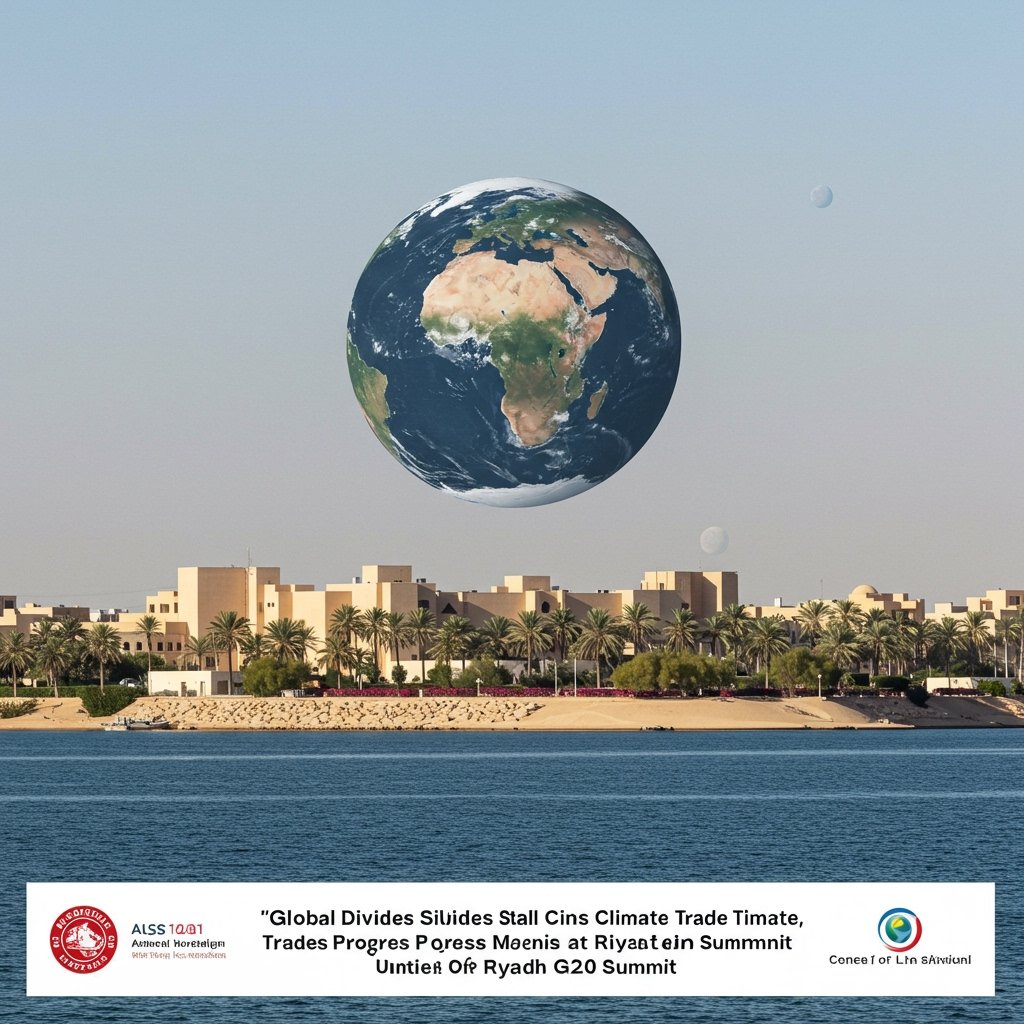G20 Summit Ends in Riyadh Amidst Key Impasses
Riyadh, Saudi Arabia – The G20 Summit concluded in Riyadh, Saudi Arabia, today, June 10, 2025, with leaders from the world’s largest economies facing significant challenges in forging consensus on critical global issues. The gathering ended without agreement on ambitious climate targets and revealed deep rifts over a proposed framework for international trade facilitation, signaling a potential shift towards more nationalistic approaches to economic and environmental policies.
The highly anticipated summit, convened to address pressing global challenges including economic stability, climate change, and digital transformation, fell short of delivering breakthrough agreements in key areas. Discussions on reducing carbon emissions, a cornerstone of global climate action efforts, encountered substantial roadblocks.
Stalled Climate Ambitions
A central point of contention revolved around proposed stricter 2040 net-zero interim targets. These targets, strongly advocated by the European Union and the United States, aimed to set a more aggressive pace for member nations to curb greenhouse gas emissions on the path towards overall net-zero goals. However, debates reportedly stalled over the feasibility and financing mechanisms required to implement such accelerated timelines across diverse economies. Developing nations and those heavily reliant on fossil fuels raised concerns about the economic costs and technological transfer needed to meet these stringent deadlines, preventing a unified commitment.
Negotiators grappled with how to equitably distribute the burden of transitioning away from carbon-intensive industries and how to mobilize the necessary financial resources, both public and private, to support clean energy infrastructure and sustainable practices globally. The failure to agree on specific carbon emission reduction deadlines, particularly the 2040 interim targets, highlights the persistent challenges in achieving a globally coordinated response to climate change that satisfies the varied economic realities and national priorities of G20 members.
Trade Framework Disagreements Persist
Parallel to the climate discussions, efforts to modernize and streamline international commerce also faced significant headwinds. Talks reportedly hit an impasse regarding the proposed ‘Global Trade Facilitation Initiative‘. This initiative was designed with the objective of standardizing digital trade documentation and tariffs across member states, aiming to reduce administrative burdens, speed up customs procedures, and boost global trade efficiency in the digital age.
However, the initiative became entangled in broader geopolitical and economic rivalries, primarily due to divergent views between the United States and China. The two economic powerhouses disagreed sharply on fundamental aspects of digital trade regulation, specifically concerning intellectual property protections and data localization rules. The United States pressed for stronger international standards to safeguard technological innovations and prevent forced technology transfers, while China emphasized national control over data flows and digital infrastructure.
These unresolved differences on crucial elements like the handling of sensitive data and the protection of proprietary technologies proved insurmountable during the summit negotiations, preventing the adoption of a cohesive G20 framework for digital trade facilitation. The failure to launch this initiative signals continued friction in global trade relations and suggests that the path to standardizing digital commerce will likely involve complex bilateral or regional negotiations rather than a unified G20 approach in the immediate future.
A Communiqué of Compromise
In the wake of these impasses, a joint communiqué was ultimately released by the G20 leaders. While the communiqué reaffirmed general commitments to global cooperation and sustainable development, observers noted it contained significantly weaker commitments on climate action and trade reform than initially hoped for. The language used in the document was widely interpreted as reflecting the lack of consensus achieved during the high-level discussions.
The less ambitious tone of the communiqué, particularly on concrete climate targets and the specifics of trade standardization, underscores the current geopolitical landscape where national interests and bilateral dynamics appear to be gaining prominence over multilateral cooperation on certain fronts. The outcome in Riyadh suggests a notable shift towards individual nations pursuing bilateral trade agreements and national climate strategies in the short term, rather than relying solely on broad, unified G20 frameworks.
Implications for Global Governance
The conclusions of the G20 Summit in Riyadh on June 10, 2025, highlight the persistent difficulties in achieving multilateral agreements on complex and economically sensitive issues like climate change and digital trade. The failure to adopt stricter 2040 net-zero interim targets and the stalling of the ‘Global Trade Facilitation Initiative’ due to disagreements over intellectual property protections and data localization rules between key members like the United States and China signal potential challenges for future global cooperation.
While the G20 remains a crucial forum for dialogue among the world’s leading economies, the Riyadh summit results suggest that progress on some of the most pressing global challenges may increasingly depend on plurilateral coalitions or individual national initiatives rather than comprehensive, unanimous G20 actions. The path forward for global climate action and the future of digital trade standardization will likely be shaped by a complex interplay of national policies and targeted agreements in the period ahead.





